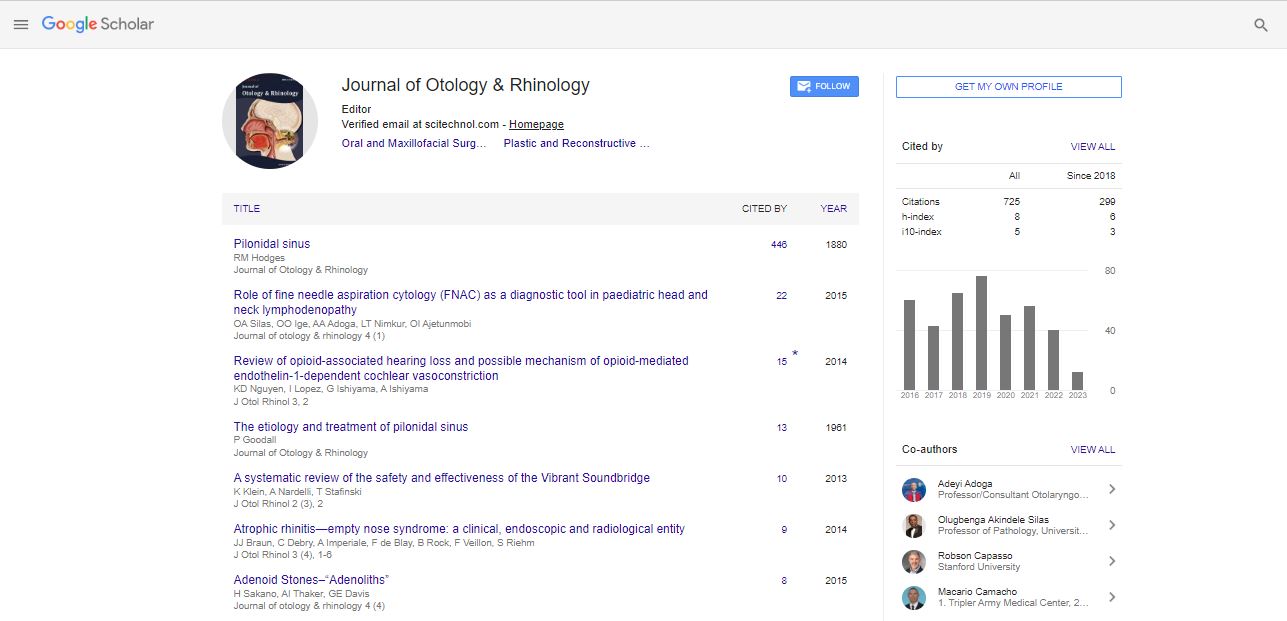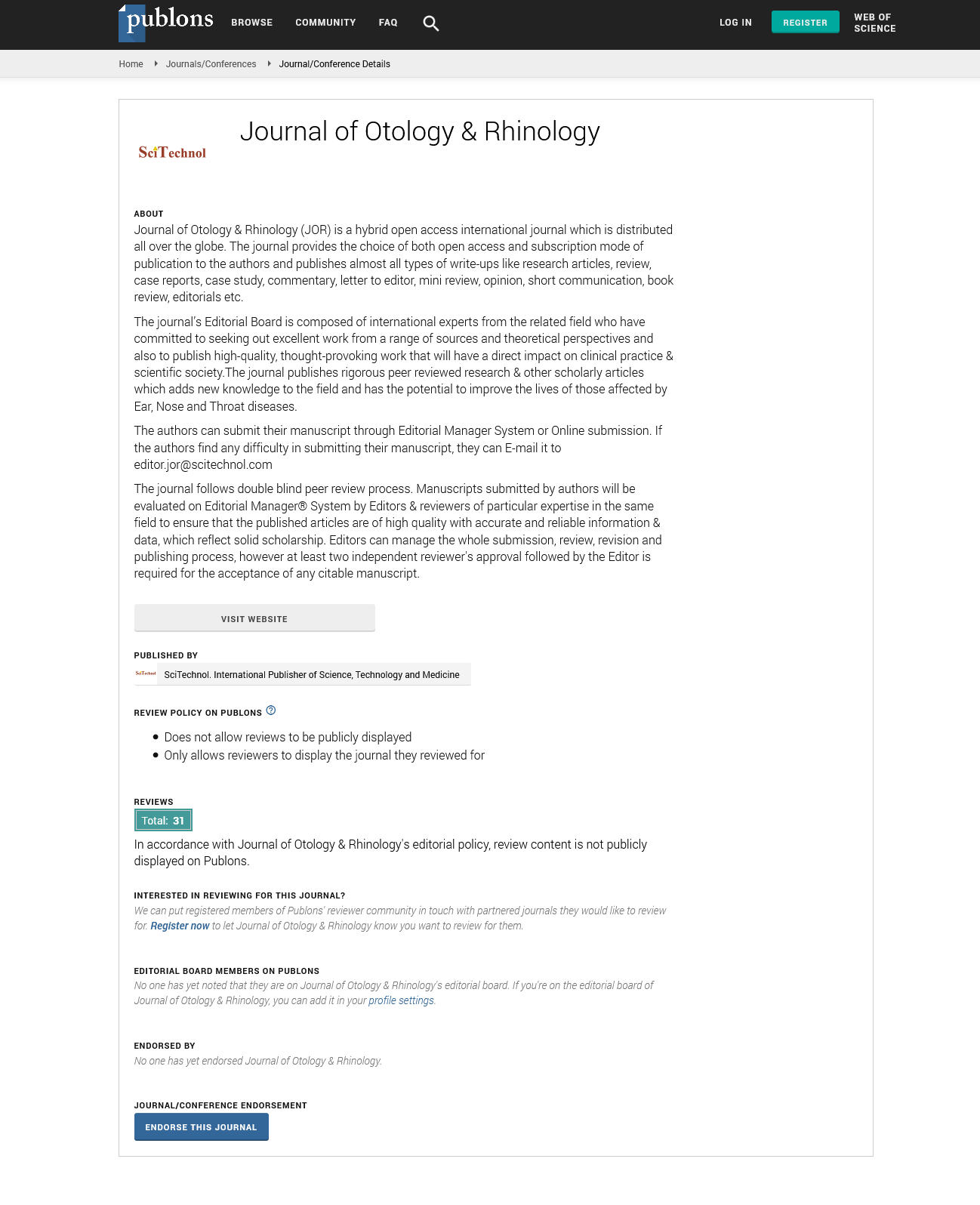Editorial, J Otol Rhinol Vol: 10 Issue: 6
Ischemic Necrosis of the Tongue in Adults
Dilyana Vicheva*
Department of Otolaryngology, Medical University of Plovdiv, Plovdiv, Bulgaria
*Corresponding author: Vicheva D, Department of Otolaryngology, Medical University of Plovdiv, Plovdiv, Bulgaria, E-mail: vichevsil04@lsuc.edu
Received date: 10 May, 2021; Accepted date: 24 May, 2021; Published date: 01 June, 2021
Keywords: Tongue
Introduction
Ischemic tongue necrosis is an uncommon symptom of a systemic condition. Since 1961, almost every occurrence of this entity has been linked to Giant Cell Arteritis (GCA), with a total of 21 cases documented. Patients with known GCA and a history of increasing head and neck symptoms were generally given this diagnosis. Tongue necrosis can be caused by electrical, thermal, or chemical injury, but the patient denied any relevant history. Adults seldom get so severe necrosis as a result of bite. Furthermore, given the patient was edentulous and had no oral parafunctional habits, this was thought to be improbable Ischemic necrosis of the tongue is an uncommon disease phenomenon since the tongue is a well-vascularized organ. End-organ hypoperfusion may occur in critically sick individuals with severe shock, resulting in tongue necrosis. The most frequent primary malignant neoplasm that develops at this location is squamous cell carcinoma. Although oral cancer metastasis is uncommon, accounting for just around 1% of all oral cancers, a quarter of all oral cancer metastases occur in the tongue, which appears to be a particularly prevalent location among edentulous individuals. Women are afflicted 1.4 to 3.0 times more frequently than males, with disease onset occurring solely in individuals over the age of 50.
Facial paralysis, labial mucosal nodules, sinusitis-related dental discomfort, jaw claudication, and pain are all orofacial symptoms of WG. Ergotamine, an alkaloid ergot widely used to treat migraines that can produce peripheral vasoconstriction, vascular stasis, and thrombosis, has been linked to tongue necrosis. Similarly, vasopressin treatment for acute bleeding management has been linked to tongue necrosis, particularly in the context of underlying atherosclerotic disease. Radical neck dissection with external carotid artery ligation in patients receiving neck irradiation has been described as a cause of unilateral tongue necrosis.
Ischemic optic neuropathy, stroke, aneurysm of the aorta, infarction of the gut, renal insufficiency, and myocardial infarction are some of the significant ischemic consequences that can occur if this illness is not treated. Oral involvement is seen in 6% to 50% of individuals with Antineutrophil Cytoplasmic Antibody (ANCA)- associated vasculitis (Wegener's Granulomatosis (WG)), however ulceration, strawberry gingivitis, salivary gland enlargement, palate osteonecrosis, and oro-antral communication are uncommon. Other causes of tongue necrosis include vascular embolization problems and anticancer treatment or radiation. There was no history of neck dissection, radiation treatment, or arterial embolization in our patient. Tongue necrosis can occur as a result of ischemia caused by hematologic diseases such essential thrombocytosis or Disseminated Intravascular Coagulation (DIC), as well as cardiovascular illness like myocardial infarction. However, no additional signs of thrombocytosis were found, and the patient's platelet counts were reported to be normal 10 days before the initial presentation.
To avoid significant consequences, including irreparable eye loss, early treatment was required even before confirmation by a temporal biopsy. Prednisone at a dose of 60 mg/d was started. Topical nystatin and chlorhexidine were also used, as well as enteric opioid analgesics. Because of the abundant blood supply from the lingual, facial, pharyngeal, and palatine arteries, as well as collateral circulation, ischemia (infarction) and necrosis of the tongue are uncommon, and are usually unilateral. GCA is by far the most prevalent cause of unilateral or bilateral tongue necrosis and should be the starting point for tongue necrosis research.
 Spanish
Spanish  Chinese
Chinese  Russian
Russian  German
German  French
French  Japanese
Japanese  Portuguese
Portuguese  Hindi
Hindi 


